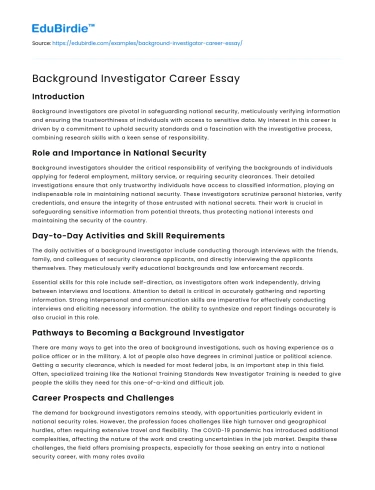Introduction
Background investigators are pivotal in safeguarding national security, meticulously verifying information and ensuring the trustworthiness of individuals with access to sensitive data. My interest in this career is driven by a commitment to uphold security standards and a fascination with the investigative process, combining research skills with a keen sense of responsibility.
Role and Importance in National Security
Background investigators shoulder the critical responsibility of verifying the backgrounds of individuals applying for federal employment, military service, or requiring security clearances. Their detailed investigations ensure that only trustworthy individuals have access to classified information, playing an indispensable role in maintaining national security. These investigators scrutinize personal histories, verify credentials, and ensure the integrity of those entrusted with national secrets. Their work is crucial in safeguarding sensitive information from potential threats, thus protecting national interests and maintaining the security of the country.
Day-to-Day Activities and Skill Requirements
The daily activities of a background investigator include conducting thorough interviews with the friends, family, and colleagues of security clearance applicants, and directly interviewing the applicants themselves. They meticulously verify educational backgrounds and law enforcement records.
Essential skills for this role include self-direction, as investigators often work independently, driving between interviews and locations. Attention to detail is critical in accurately gathering and reporting information. Strong interpersonal and communication skills are imperative for effectively conducting interviews and eliciting necessary information. The ability to synthesize and report findings accurately is also crucial in this role.
Pathways to Becoming a Background Investigator
There are many ways to get into the area of background investigations, such as having experience as a police officer or in the military. A lot of people also have degrees in criminal justice or political science. Getting a security clearance, which is needed for most federal jobs, is an important step in this field. Often, specialized training like the National Training Standards New Investigator Training is needed to give people the skills they need for this one-of-a-kind and difficult job.
Career Prospects and Challenges
The demand for background investigators remains steady, with opportunities particularly evident in national security roles. However, the profession faces challenges like high turnover and geographical hurdles, often requiring extensive travel and flexibility. The COVID-19 pandemic has introduced additional complexities, affecting the nature of the work and creating uncertainties in the job market. Despite these challenges, the field offers promising prospects, especially for those seeking an entry into a national security career, with many roles available that support obtaining the necessary security clearance.
Conclusion
My aspiration to become a background investigator is fueled by a dedication to national security and a keen interest in the investigative process. Despite the challenges, such as geographic hurdles and the evolving nature of the role, I am eager to embrace these as part of a rewarding career. I look forward to contributing my skills and determination to this vital field, playing a crucial part in maintaining the safety and integrity of national security.






 Stuck on your essay?
Stuck on your essay?

